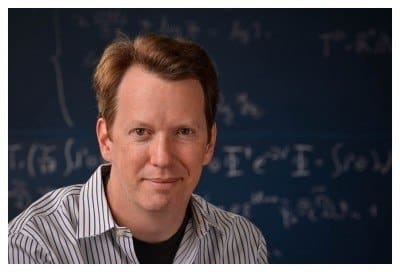The Waking Up Podcast: Sam Harris vs. Sean Carroll on Free Will

Sam Harris recently had Sean Carroll on his Waking Up podcast >, and to my delight they arrived pretty quickly at the free will topic.
You can read more of my free will content here >.
Carroll is both a physicist and a compatibilist, which was both surprising and exciting. It was surprising because I naturally expect hard science types to be incompatibilists (my own bias), and it was exciting because I couldn’t wait to hear his argument.
I’ve already been flirting with my own version of almost-compatibilism, in what I call The Absurdist Chasm >. This is the argument that humans are unable to functionally operate as an incompatibilist in the ways that matter, e.g., trying to be a better person, planning for the future, etc. Basically, the moment you start planning you’re assuming that something you can do could make a difference, which it can’t.
This is a subtlety that I’m trying to warm Sam up to, with little success so far. I think the answer comes to us from Camus’ Absurdism, which is what that piece is about.
The discussion
Anyway, here’s how the debate between Sam and Sean proceeded.
They both agreed Libertarian free will was false.
Sam talked about the ability to have done otherwise.
Sean gave some background on the multiple universes idea, which is a prevailing theory at this point.
Sean said that Sam’s concept of "other options" was strange because it ultimately came down to not knowing what the other options were. So basically, because we couldn’t know what the other options were, it’s the same as us making choices.
Sam asked to confirm this—i.e., that the opening for free will lies in our lack of knowledge of all the variables.
Sean agreed.
Sam confirmed this by asking if we knew everything would this erode this view of freedom.
Sean agreed.
Sam then said that it didn’t matter how much we knew because if someone as rolling dice and we were doing it, it wouldn’t make us free.
I’m paraphrasing Sean here, but I believe I’m doing it accurately.
Sean then made the main point, which is that the model of us making choices is simply a matter of a best, usable description of what happens with humans. He’s not claiming it’s particularly accurate, or true, or precise. He’s saying it’s most true and most useful.
Analysis
This argument from Sean was fascinating to me because I see his point and I agree with him. He’s saying it’s a useful model to imagine humans as making choices. 100%.
Where I think he’s going wrong is not realizing that different questions require different models.
If you’re asking 10,000 people what kind of shows they like to watch, or whether they want to go into engineering or social sciences, then we should use that model. It makes no sense to talk about degree selection, or food preferences, at the level of physics or biology. It’s just people making choices.
But when the question changes to something like:
What should be done with violent criminals?
That model of "humans make choices" suddenly fails for anyone who simultaneously understands the biology and wishes to be just. Sam’s example here was spot on.
If there were a pill that could cure you of psychopathy, then when someone killed people we’d simply call them sick—not evil.
In short, our criminal just system will vary significantly based on whether we use the "people make bad choices" model or the "evil people are broken" model.
So I think they were almost communicating, but not quite. This is sadly a common occurrence on Sam’s podcast, but I think that’s usually because 1) malice on the part of the guest, or 2) the topics are so nuanced.
I think Sam is obviously right about the fact that seeing humans as making real (Libertarian-like) choices is a poor model handling human criminal justice in a lot of cases. And I think Sean is obviously right that that same model is just fine for most everyday situations.
So this brings me back to The Absurdist Chasm >. The truth is that we need to be able to do what Camus’ advocated. We have to know the impossible truth while simultaneously behaving as if the fairytale were possible.
We have to become comfortable with living as Compatibilists for 99% of situations, all the while knowing that reality is Incompatibilist.
To some that makes them Compatibilists. To me—and I think to Sam—that makes us Incompatibilists.
Once again it comes down to semantics. And I think Sam should do his best to address this specific Absurdism issue with new guests like Sean and also with Dan Dennett the next time he talks to him.
In one mode we’re talking about true nature of the world, and in another we’re talking about the way we conduct our everyday, human lives. That’s why Camus is so relevant here.
It’s that tension between the emptiness of reality and our innate optimism that defines so much of our existence.
Notes
Both Sean Carroll and Dan Dennett have single syllable first names followed by double consonant versions of their last names. And both are Compatibilists.